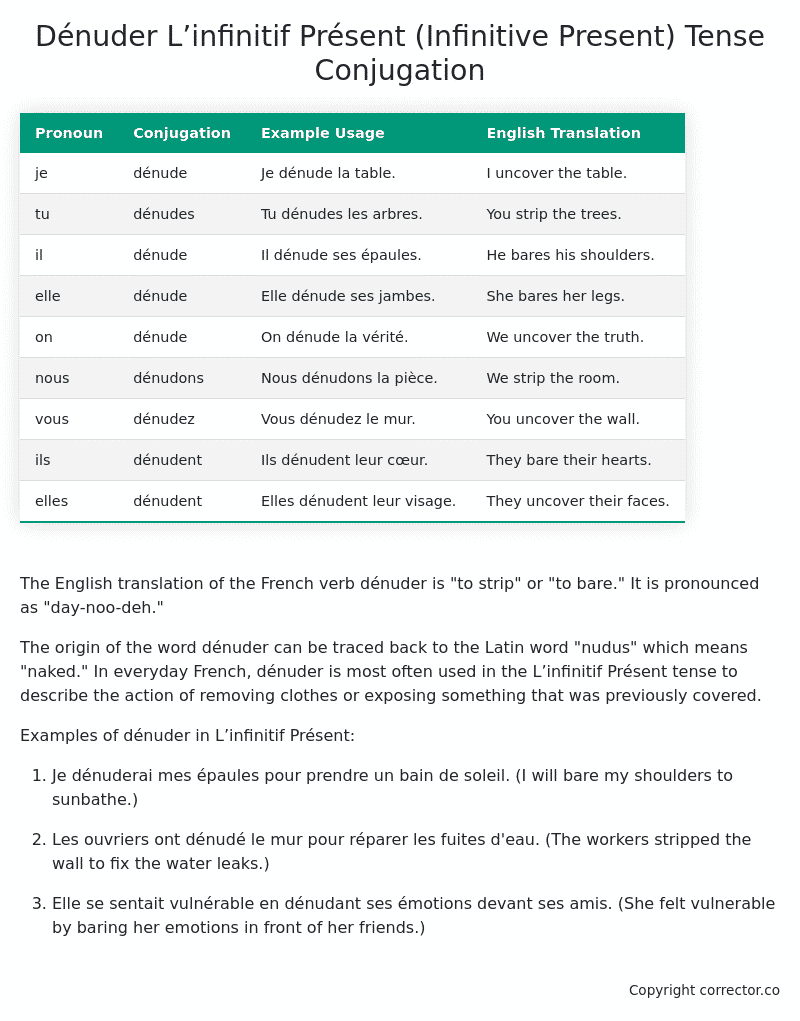L’infinitif Présent (Infinitive Present) Tense Conjugation of the French Verb dénuder
Introduction to the verb dénuder
The English translation of the French verb dénuder is “to strip” or “to bare.” It is pronounced as “day-noo-deh.”
The origin of the word dénuder can be traced back to the Latin word “nudus” which means “naked.” In everyday French, dénuder is most often used in the L’infinitif Présent tense to describe the action of removing clothes or exposing something that was previously covered.
Examples of dénuder in L’infinitif Présent:
-
Je dénuderai mes épaules pour prendre un bain de soleil. (I will bare my shoulders to sunbathe.)
-
Les ouvriers ont dénudé le mur pour réparer les fuites d’eau. (The workers stripped the wall to fix the water leaks.)
-
Elle se sentait vulnérable en dénudant ses émotions devant ses amis. (She felt vulnerable by baring her emotions in front of her friends.)
Table of the L’infinitif Présent (Infinitive Present) Tense Conjugation of dénuder
| Pronoun | Conjugation | Example Usage | English Translation |
|---|---|---|---|
| je | dénude | Je dénude la table. | I uncover the table. |
| tu | dénudes | Tu dénudes les arbres. | You strip the trees. |
| il | dénude | Il dénude ses épaules. | He bares his shoulders. |
| elle | dénude | Elle dénude ses jambes. | She bares her legs. |
| on | dénude | On dénude la vérité. | We uncover the truth. |
| nous | dénudons | Nous dénudons la pièce. | We strip the room. |
| vous | dénudez | Vous dénudez le mur. | You uncover the wall. |
| ils | dénudent | Ils dénudent leur cœur. | They bare their hearts. |
| elles | dénudent | Elles dénudent leur visage. | They uncover their faces. |
Other Conjugations for Dénuder.
Le Present (Present Tense) Conjugation of the French Verb dénuder
Imparfait (Imperfect) Tense Conjugation of the French Verb dénuder
Passé Simple (Simple Past) Tense Conjugation of the French Verb dénuder
Passé Composé (Present Perfect) Tense Conjugation of the French Verb dénuder
Futur Simple (Simple Future) Tense Conjugation of the French Verb dénuder
Futur Proche (Near Future) Tense Conjugation of the French Verb dénuder
Plus-que-parfait (Pluperfect) Tense Conjugation of the French Verb dénuder
Passé Antérieur (Past Anterior) Tense Conjugation of the French Verb dénuder
Futur Antérieur (Future Anterior) Tense Conjugation of the French Verb dénuder
Subjonctif Présent (Subjunctive Present) Tense Conjugation of the French Verb dénuder
Subjonctif Passé (Subjunctive Past) Tense Conjugation of the French Verb dénuder
Subjonctif Imparfait (Subjunctive Imperfect) Tense Conjugation of the French Verb dénuder
Subjonctif Plus-que-parfait (Subjunctive Pluperfect) Tense Conjugation of the French Verb dénuder
Conditionnel Présent (Conditional Present) Tense Conjugation of the French Verb dénuder
Conditionnel Passé (Conditional Past) Tense Conjugation of the French Verb dénuder
L’impératif Présent (Imperative Present) Tense Conjugation of the French Verb dénuder
L’infinitif Présent (Infinitive Present) Tense Conjugation of the French Verb dénuder (this article)
Struggling with French verbs or the language in general? Why not use our free French Grammar Checker – no registration required!
Get a FREE Download Study Sheet of this Conjugation 🔥
Simply right click the image below, click “save image” and get your free reference for the dénuder L’infinitif Présent tense conjugation!

Dénuder – About the French L’infinitif Présent (Infinitive Present) Tense
Forming the Infinitive Present
Common Everyday Usage Patterns
As a Verb’s Dictionary Form
After Modal Verbs
As an Imperative
In Infinitive Clauses
Interactions with Other Tenses
Present Tense
Future Tense
Conditional Tense
Passé Composé
Imperfect Tense
Subjunctive and Conditional Moods
Summary
Want More?
I hope you enjoyed this article on the verb dénuder. Still in a learning mood? Check out another TOTALLY random French verb conjugation!


